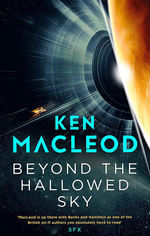
Lightspeed Trilogy, The (TPB) nr. 1: Beyond the Hallowed Sky (Macleod, Ken)
When a brilliant scientist gets a letter from herself about faster-than-light travel, she doesn't know what to believe. The equations work, but her paper is discredited - and soon the criticism is more than scientific. Exiled by the establishment, she gets an offer to build her starship from an unlikely source. But in the heights of Venus and on a planet of another star, a secret is already being uncovered that will shake humanity to its foundations.
Udgivet af Orbit
Ken Macleod
Ken MacLeod (born 2 August 1954), an award-winning Scottish science fiction writer, lives in South Queensferry near Edinburgh.
MacLeod graduated from Glasgow University with a degree in zoology and has worked as a computer programmer and written a masters thesis on biomechanics.[1] His novels often explore socialist, communist and anarchist political ideas, most particularly the variants of Trotskyism and anarcho-capitalism or extreme economic libertarianism. Technical themes encompass singularities, divergent human cultural evolution and post-human cyborg-resurrection. MacLeod's general outlook can be best described as techno-utopian socialist,[2][3] though unlike a majority of techno-utopians, he has expressed great scepticism over the possibility and especially over the desirability of Strong AI.
He is known for his constant in-joking and punning on the intersection between socialist ideologies and computer programming, as well as other fields. For example, his chapter titles such as "Trusted Third Parties" or "Revolutionary Platform" usually have double (or multiple) meanings. A future programmers union is called "International Workers of the World Wide Web", or the Webblies, a reference to the Industrial Workers of the World, who are nicknamed the Wobblies. There are also many references to, or puns on, zoology and palaeontology. For example in The Stone Canal the title of the book, and many places described in it, are named after anatomical features of marine invertebrates such as starfish.
He is part of a new generation of British science fiction writers, who specialise in hard science fiction and space opera. His contemporaries include Stephen Baxter, Iain M. Banks, Alastair Reynolds, Adam Roberts, Charles Stross, Richard Morgan and Liz Williams.

